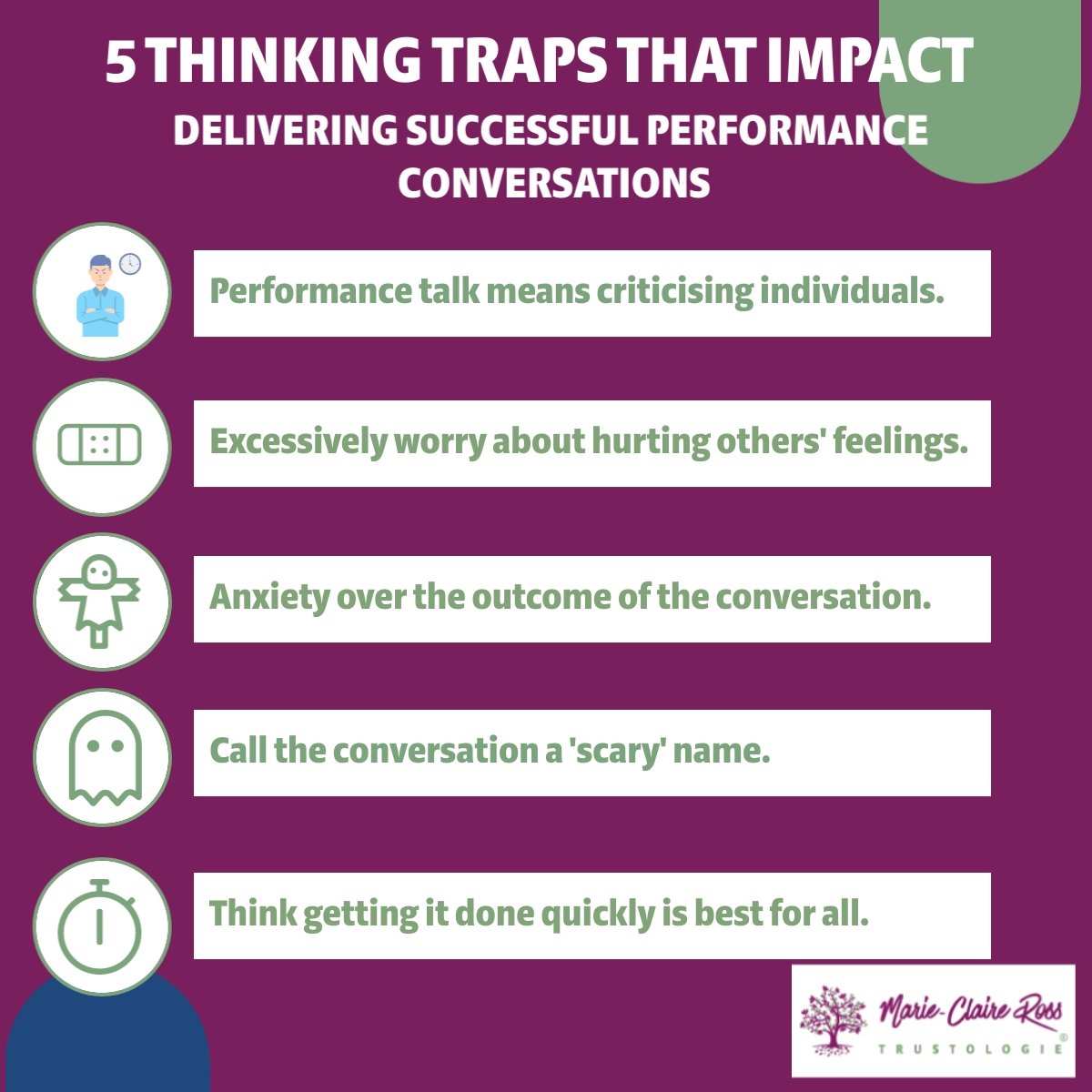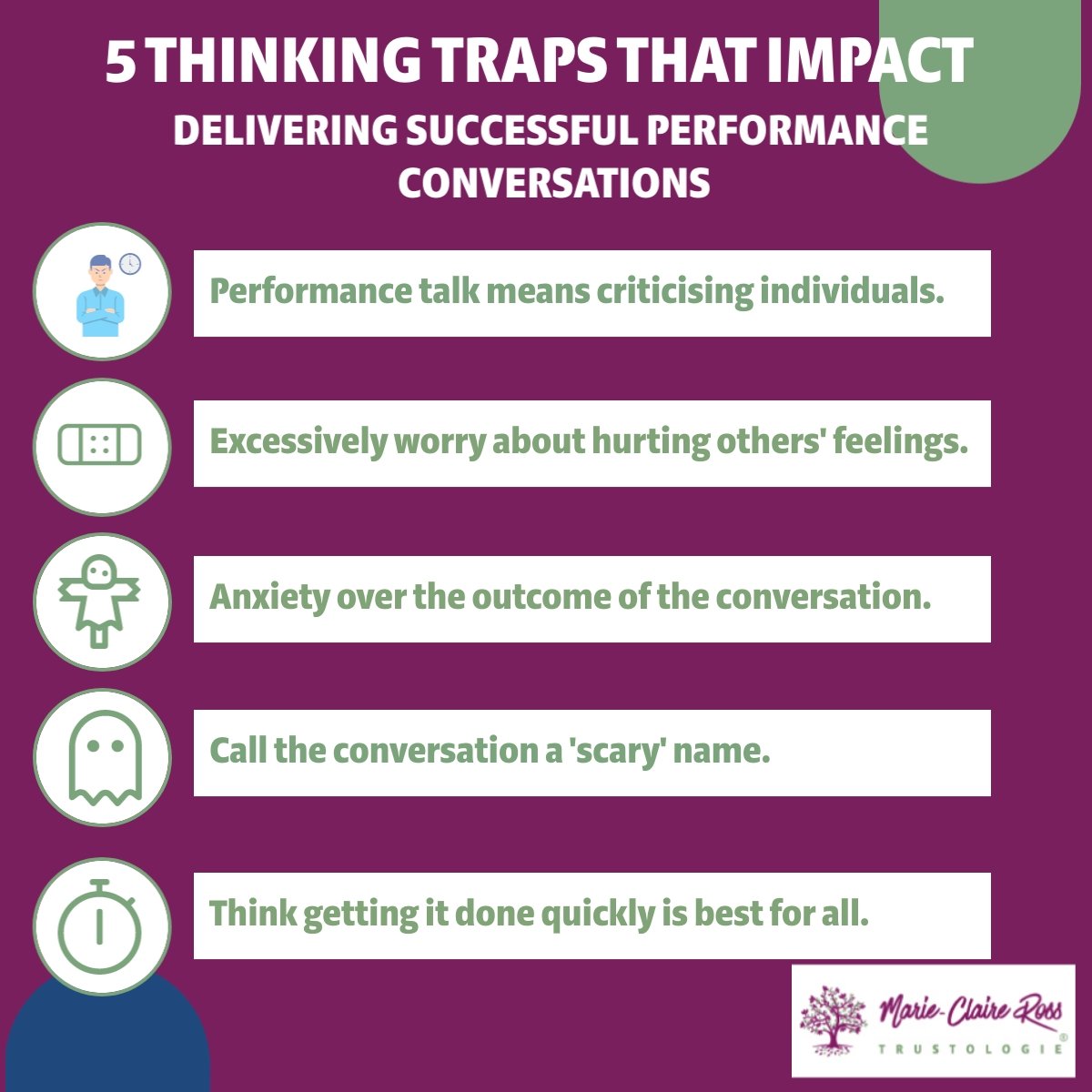8 min read
Beyond the "Why": 5 Coaching Secrets to Unlock Curiosity in Leadership
When my daughter was 17 months old, she discovered a superpower: the word “Why?”For the next two years, it was her response to almost everything.
Develop leaders, strengthen executive teams and gain deep insights with assessments designed to accelerate trust and performance.

Transform how your leaders think and perform with keynotes that spark connection, trust and high-performance cultures.

Explore practical tools, thought-leadership and resources to help you build trusted, high-performing teams.

Trustologie® is a leadership development consultancy founded by Marie-Claire Ross, specialising in helping executives and managers build high-trust, high-performing teams.

5 min read
Marie-Claire Ross : Updated on November 14, 2023

If there is one thing that both new and experienced managers or leaders worry about - it's having a performance conversation.

A positive mindset is critical before delivering a growth conversation. Expecting it to go badly is almost like pre-paving that result.
A lot of leaders worry so much about the conversation that they deliver it in a poor fashion. Little things like body language and tone matter. So if you are expecting the worst it often means you avoid eye contact, laugh nervously during the session and don't listen properly, so that you make assumptions about what your direct report is saying. The result is that they feel uncomfortable and misunderstood.
It's really important to work on your mindset before a challenging conversation. This entails anticipating the best possible outcome and maintaining a focus on mutual growth and positive results. By doing so, your direct report will develop a deeper trust in your leadership, paving the way for both of you to flourish from the discussion.
We often label performance conversations with a scary name. Yet, the words we use can often make us feel good or bad.
According to a study conducted by Harvard, the choice of words used during a feedback conversation can greatly impact how it is received. The term "feedback" is often associated with evaluation and looking back, while "advice" is seen as forward-looking and focused on development.
You can help both yourself and your report by renaming the conversation a term that is more beneficial to both of you. Rather than label the conversation as a performance conversation or feedback, label it "a debrief", "advice" or the term I like to use is a "growth conversation."
Changing the language like this will put both you and your direct report at ease.
A lot of managers feel so nervous about giving feedback that they do it in a rushed manner, so they get it over and done with as fast as possible.
This often means that don't plan as thoroughly as they should and they aren't really present to the conversation. Process focused leaders can often be so diligent in following a process that they aren't really listening. Nor are they particularly calm, which can make their report even more nervous, and the conversation even more awkward.
Moreover, their direct report is left with a sense of being unheard and unseen, unable to fully express their true selves.
In the previously mentioned Zenger and Folkman study, the less people felt their managers listened to them, the more likely they were to believe that their managers were not being honest and straightforward.
Give people time to express their viewpoint. Take time to pause and really listen, so that you can also answer their questions and give them the clear action steps they need to improve. Make sure you schedule ample time to have the conversation depth that is needed, rather than what makes you feel comfortable.
These five common thinking traps around performance conversations can have a disastrous impact on our ability to give helpful feedback.
It's important to reframe how you think about delivering a performance conversation. You are there to bring the best out of your people and help them to learn and grow. This means changing your mindset and using more positive language around the topic.
Remember, it's not about reprimanding people or hurting people's feelings, it's about focusing on improving your direct reports' capabilities and supporting their growth.
By focusing on these strategies, you can overcome thinking traps that hinder the development of a trusted work relationship with your direct report. This will allow you to create an environment that fosters growth and collaboration, ensuring both you and your team member can thrive.

8 min read
When my daughter was 17 months old, she discovered a superpower: the word “Why?”For the next two years, it was her response to almost everything.

11 min read
I have a friend who often finds herself at the mercy of her emotions. Recently, she called me to rehash a confrontation she’d had with a group of...

9 min read
True leadership presence isn’t a performance or a set of charisma hacks; it is the felt experience of who you are being in the room. By cultivating...

A few months ago, I caught up with a CEO from a midsize firm for lunch. He was keen to tell me that people only care about money. His business that...

Why is that successful and well-managed companies struggle with change and disruptive innovation? Too often, what got companies to where they are...

According to a Canadian research firm, trust between a manager and employee, is the most important predictor of employee engagement.